
“Many times in refugee camps I see smiles of joy I do not see in Western cities.”
Fr. Luis Montes is an Argentinian missionary of the Institute of the Incarnate Word. He has been living in the Middle East for 20 years now and currently, he is staying in Iraq, alongside those who suffer the most. During the week of February 6 to 12, he visited many cities of Spain to present the Religious Freedom in the World 2016 report by the Aid to the Church in Need (ACN). This report about the situation of religious freedom in 196 nations is published every 2 years. After a press conference for the media, Early Christians had an exclusive interview with him.
Fr. Montes, what is truly going on in Iraq? Are we, the Western people, getting the right information from the media?
In general, the information arriving from the Middle East to Europe comes in bits and pieces only and is sometimes distorted. Different interests of powerful people play around the current situation in Iraq. For instance, with the affairs of Iraq: Some foreign soldiers invaded the country under the pretext of some weapons of mass destruction which they never found since these weapons were not really there. And they are doing the same now in Syria. Foreign soldiers have supported terrorist groups by calling them to moderate the rebels just out of a mere political affair: to oppose Iran, an ally of Syria, and to favor Saudi Arabia. It is just a matter of geopolitics.
Pope Francis has said more than once: “How many of those wars are just because of matters of arms sales, because of oil, because of will of power!”. These terrorist groups are treated like pawns, a cannon fodder. Yet, at the same time, these terrorists are mad, degenerates, who use religion for their own purposes. But the people really behind these groups are Western people, wearing jackets and ties, doing everything in the name of economic interest and power.
The news is filtered by such interests. What people in the Middle East see is not what the people in the media disclose to the people. In Syria, for example, people were talking about the Arab Spring. “Peaceful young Syrians want democracy.” That is completely false because only a few wanted this. The Arab Spring was, since the beginning, something foreign in Syria. Syrians told us: “Some people have arrived who do not speak the way we speak Arabic and some of them even do not know Arabic altogether. They are foreigners, from Afghanistan, from Pakistan, from Saudi Arabia, from Libya, from Turkey.” Some of these people are not even Arab, like the Turks.
And what happened? Massacres were committed since then and they were hidden. People in places like Aleppo, worried about the situation, went out to make mass demonstrations to support the president, while European TV channels showed them as demonstrations against the president. People said: “We wanted something and they used us to convey the opposite.” So here, in Europe, there is no information about what is really going on in Iraq, you do not know well.
How can they stay happy amid so much suffering, of war, of scarcity, and of fear of persecution? What is the most impressive thing about Iraqi Christians?
What we see is that, despite the suffering they are going through –because they really suffer a lot: they lost their relatives, they had to abandon everything, they are left homeless, they are only sustained by charities, they are unable to work, they do not know what will happen to their children…– they still find strength in faith and in union with God. Sometimes they even tell us that they are happier than before.
There is a statement I usually say, –and it may seem an exaggeration, but it is not– “many times in refugee camps I see smiles of joy I do not see in Western cities.” They have lost everything but they have God. They are in such a peace that seems impossible to attain here, a peace that material things cannot provide. I also know some that are grateful because they lost everything and now they can only worry about what is really important. Obviously, ordinary people will reject this argument. I have met skeptics who tell me that that cannot be true. I tell them: “well, it may be true or not, go there and see for yourself.” Go and see how they live with happiness and in peace… in the middle of a real suffering.
What we find there is people with wonderful tenacity, people who know how to respond to God’s grace and who have shown a unique composure impossible to see in other places. It is the happiness stemming from, for instance, the ability to forgive completely the ones who hurt them. The incapacity to forgive, which for most of us something that is hard to take out, brings us unhappiness. I would like to share the most shocking case for me.
You probably know that a few years ago, ISIS beheaded 21 Coptic Egyptians along a beach in Libya. They filmed the execution. The mother of two of those young boys saw how her children got their throat cut in front of the camera. When people asked her what would she do if she saw those terrorists in the street, she answered: “I would invite them to have a coffee, because they have taken my children to the Kingdom of Heaven.”
That woman lives in peace. The incapacity to forgive is a disgrace because it leaves us unhappy. They (the prosecuted Christians) have that capacity to forgive. And they are an incredible example. Let us think about ourselves and how difficult it is for us to forgive someone who hurts us. And sometimes we forgive, but we still feel a bit of resentment. That brings us unhappiness; on the other hand, the Iraqi Christians manage to forgive with all their heart.
So, who then is truly free here? Me, who cannot forgive, or that woman who accepted that tragedy and was able to forgive the murderers from the bottom of her heart? She is the real hero, not me. She is the one who has will power. She is the one who is intelligent, although she does not have much education. She is the one who does what she should do. In short, she is the one who best imitates Christ, who, in the Cross, forgave those who crucified him and, from there, brought us Salvation.
That is why the true protagonists are not the killers. Those are poor, wretched slaves of their passions, slaves of their ideologies. The prosecuted Christians are the true protagonists.
“If it could be said of us ‘see how they love one another!’, we could change the world like the early Christianity did.”
Why does religious freedom continue to be at risk in the 21stCentury? Who is attacking this freedom?
Religious freedom is attacked, first, by those who do not accept the other, the fundamentalists. In the case of Islam, it is very distinguished, because they are many… but religious freedom is also attacked by those who, regardless of what others think, use these people for their own benefit. They do not have any problem with encouraging and financing these fundamentalists, people who are going to kill other people just because they think different from them as long as they get more power or more money. Both people are guilty.
From my experience, what I see in Middle East are both things: a terrorist who shouts, “Allah is the greatest” and kills; and an official who, thousands of kilometers away, decides a war based on lies, saying he does it for the good of the people, to release them from tyranny. That is all lies. And that is why, it is so sad to see how the attack against Christians and other minorities is a joint venture between religious fundamentalists and those who do not believe in anything and only care about their own welfare.
“Twelve men with little culture and who had abandoned and betrayed Christ. Those were the ones who changed the world.”

What can we, the Christians of today, prosecuted or not, learn from the Early Christians?
There is a sentence which shows the special magnanimity of the Early Christianity. People commented, “see how they love one another!” (Tertullian)
If there were true charity, there would be no war. People would live in peace. The Gospel tell us that the Pharisees took Christ to Pilate because they envied Him. Such attitudes – envy, selfishness, hatred – are problems of lack of charity. If it could be said of us “see how they love one another!”, we could change the world like the early Christianity did.
Who were those who converted Europe and the whole world? Twelve men with little culture, who did not seem very brave, since they had abandoned and betrayed Christ. But they were the ones who changed the world.
Well, we can do the same. We must learn from them: “see how they love one another!” . We must forget about ourselves and start thinking about the others. Human life is a non-sense if it is not a life dedicated to others. The Holy Trinity is a community of love, of self-surrender. God does even more: he created the world to make us partakers of his happiness. And he does all this, without gaining anything, because he does not need us, we add nothing to this world. We are invited to do the same with others. The Early Christians understood this, and so did the prosecuted Christians.
Another characteristic of the Early Christianity was that they were united to Mary. The devotion of the prosecuted Christians to Our Lady is something very poignant. One of the things which gives them hope and strength is their devotion to Mary. For them, she is not a distant person, but somebody who is beside them. They speak to her according to what she really is: alive, a real person, a real Mother who takes care of them.
That is what we can learn from the Early Christians: charity, not being afraid to profess our faith. We should learn that from the Early Christian communities and from the prosecuted Christians. My point is that the prosecuted Christians, like those in Iraq, are very close to the Early Christians. It is us the ones who are far from the Early Christians. We are living in a world where there is no dedication, in a world full of selfishness, in a world where people do not understand the idea of dedicating oneself completely. Nowadays, couples get into divorce because they fail to do more for the other. We are living in a fast progressing world where people think they are better because they have more material things as if those were the measure of a perfect life. Those material advances are very good, but they do not make us more perfect, more human.
“The devotion of the prosecuted Christians to Our Lady is something very poignant.”
Interview by José Manuel Navarro, Nacho Laguía and John Joseph Paje
Pictures given by ACN and VLC.



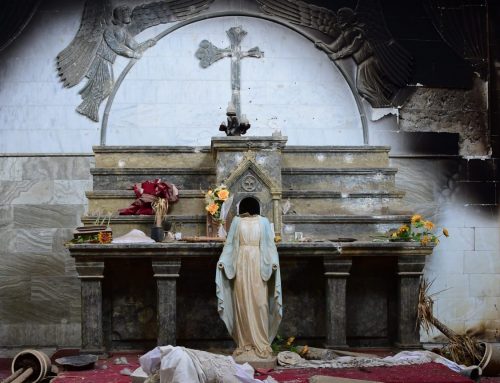
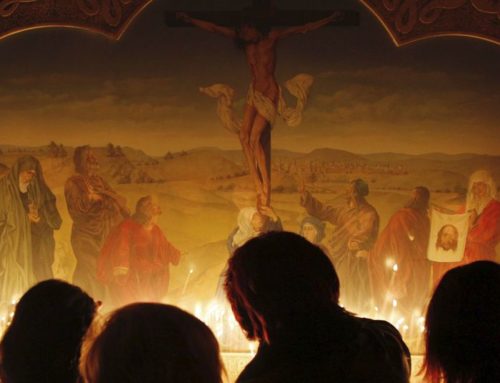
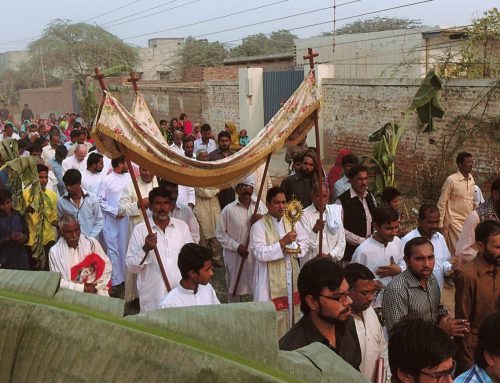
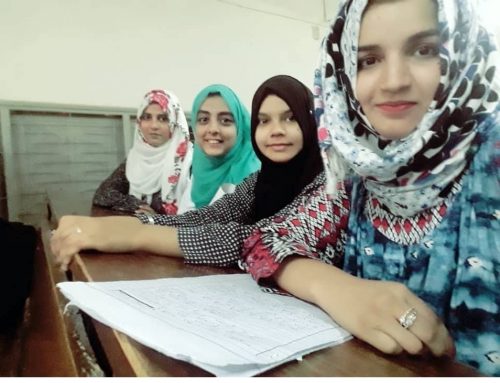
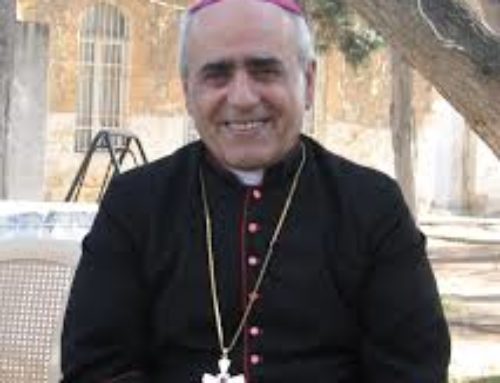
Leave A Comment
You must be logged in to post a comment.